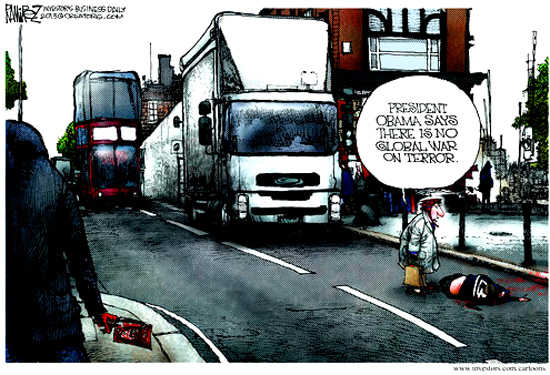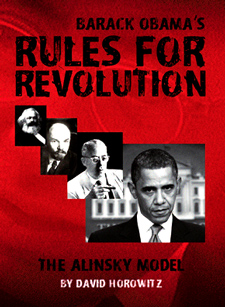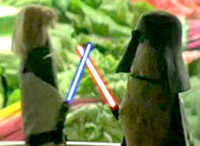Date: June 5, 2013
President Obama: There Is No Global War On Terror
From: Freedom is Knowledge
- Please feel free to share these stories with others. All news links have been verified -
Links to Web sites are highlighted in color
Headline:
Al-Qaeda Chief Warns After Boston Bombing: Attacks On U.S. [Now] In 'Everyone's Reach' - france24 . . . as progressives worship at the altar of a Harvard-trained crotch salute president. |
Cartoons by Michael Ramirez
Revolutionary Means and Ends
(Rules For Revolution, David Horowitz, Pages 42-51)
Sanford Horwitt prefaces his biography of Alinsky, Let Them Call Me Rebel, with an anecdote he felt illuminated Alinsky's method. In this anecdote, Alinsky shares his wisdom with students wishing to protest the appearance on their campus of the first George Bush, then America's representative to the UN during the Vietnam War:College student activists in the 1960s and 1970s sought out Alinsky for advice about tactics and strategy. On one such occasion in the spring of 1972 at Tulane University's annual week-long series of events featuring leading public figures, students asked Alinsky to help plan a protest of a scheduled speech by George Bush, then U.S. representative to the United Nations, a speech likely to be a defense of the Nixon Administration's Vietnam War policies [Note: the Nixon Administration was then negotiating with the North Vietnamese Communists to arrive at a peace agreement- DH]
The students told Alinsky that they were thinking about picketing or disrupting Bush's address. That's the wrong approach, he rejoined - not very creative and besides, causing a disruption might get them thrown out of school. [Not very likely-DH] He told them, instead, to go hear the speech dressed up as members of the Ku Klux Klan, and whenever Bush said something in defense of the Vietnam War, they should cheer and wave placards, reading 'The K.K.K. supports Bush.' And that is what the students did with very successful, attention-getting results.
This vignette tells you everything you really need to know about Alinsky's ethics and his attitude towards means and ends. Lenin once said that the purpose of a political argument is not to refute your opponent "but to wipe him from the face of the earth." The mission of Alinsky radicals is a mission of destruction. It didn't matter to Alinsky that the Vietnam War was not a race war, that millions of South Vietnamese opposed the Communists.
It didn't matter to Alinsky who George Bush actually was or what he believed because in a war the objective is to kill the enemy and destroy the system he represents. Therefore seize on any weapon, in this case a symbol of one of the greatest evil that any Americans were ever associated with, and use it to obliterate everything good America ever did. If America's cause in Vietnam is the Ku Klux Klan, then its cause is evil and America is evil. If George Bush is the Ku Klux Klan, no more needs to be said. He has been rendered by this tactic a non-person. These are the methods of political discourse that Stalinists perfected and that radicals (often described as liberals) continue to use to this day.
The most important chapter of Alinsky's manual is called "Means and Ends," and is designed to address Alinsky's biggest problem: How to explain to radicals who think of themselves as creating a world of perfect justice and harmony, that the means they must use to get there are Machiavellian - deceitful, conniving, and ruthless?
The radical organizer, Alinsky explains, "does not have a fixed truth - truth to him is relative and changing; everything to him is relative and changing. He is a political relativist." And that will do it. Being a radical in the service of the higher good is a license to do anything that is required to achieve that good.
Liberals share radicals' Utopian agendas of a just and peaceful world but are hampered because they have scruples. They support radical ends but because they are principled they don't like the means radicals use to get to their ends. As a result, Alinsky's contempt for them is boundless. In his first book, Reveille for Radicals he wrote: "While liberals are most adept at breaking their own necks with their tongues, radicals are most adept at breaking the necks of conservatives."
In contrast to liberals, who in Alinsky's eyes are constantly tripping over their principles, the rule for radicals is that the ends justify the means. This was true for the Jacobins, for the Communists, for the fascists and now for the post-Communist left. This is not because radicals begin by being unethical people. On the contrary, their passion for a future that is ethically perfect is what drives their political agenda and causes many to mistake them for idealists. But the very nature of this future - a world without poverty without war, without racism, and without "sexism' - is so desirable, so noble, so perfect in contrast to everything that exists as to justify any and every means to achieve it.
If the radicals' utopia were actually possible, it would be criminal not to deceive, lie, and murder to advance the radical cause which is, in effect, redemption of mankind. If it were possible to provide every man, woman and child on the planet with food, shelter and clothing as a right, if it were possible to end bigotry and human conflict, what sacrifice would not be worth it?
The German philosopher Nietzsche had a phrase for this: "Idealism kills." And of course the great atrocities of the modern era, whether Nazi or Communist, were committed by people who believed in a future that would save mankind. When you are overthrowing the existing order, you must break the rules to do it. The nobler the end the easier it is to justify breaking the rules to get there. Thus to be really committed to being a radical is to be committed to being an outlaw. During the sixties, SDS leader Tom Hayden once described the utility of the drug culture to me, although he claimed he was not a part of it. Once you get a middle class person to break the law, he said (and he was thinking of students), they are on their way to becoming revolutionaries.
In the sixties, radicals were generally proud of the idea that they were linked to criminals. Gangsters such as John Dillinger and films such as The Wild Bunch and Bonnie and Clyde which celebrated American outlaws were popular among them. Abbie Hoffman's Steal This Book was a manifesto of the creed and Obama friend and Weatherman leader Bernadine Dohrn's tribute to the murderer Charles Manson was its extreme expression. This romance continues to be expressed in radicals' affinity for criminals and their causes at home and abroad, as it was in Alinsky's early attraction to Capone's enforcer Frank Nitti.
The Stalinist historian Eric Hobsbawm gave the radicals' romance an academic veneer in a book about Sicilian criminals, whom he described as "primitive rebels," in other words, revolutionaries avant la lettre. Among the chapters of Primitive Rebels is one titled "Social Bandits." In Hobsbawm's description these criminals were avatars of "social justice," their activity "little more than endemic peasant protest against oppression and poverty." Hobsbawm claimed that the activity of the "mob" was "always directed against the rich" (in other words okay). The French radical Pierre-Joseph Proudhon gave license to radicals to steal and destroy in socialism's most famous epigraph: "Property is Theft." In reality, of course, it is socialism that is theft.
Another reason why radicals believe that their goals justify criminal means and also why they can be relied on to lie, steal votes and justify murder when committed by their political friends, is because they are engaged in a permanent war whose goal is the salvation of mankind. In this context restraint of means can easily seem finicky.
Alinsky's entire argument is an effort to answer liberals who refuse to join the radical cause, with the objection "I agree with your ends but not your means." To this Alinsky replies that the very question of whether "the end justifies the means?" is "meaningless." The real question according to Alinsky is "Does this particular end justify this particular means?" But this is disingenuous, since radicals are in a permanent war and "The third rule of the ethics of means and ends is that in war the end justifies almost any means."
Writes Alinsky: "The man of action views the issue of means and ends in pragmatic and strategic terms. He has no other problem." In other words, Alinsky's radical is not going to worry about the legality or morality of his actions, only their practical effects. If they advance the cause they are justified. "He asks of ends only whether they are achievable and worth the cost; of means, only whether they will work."
If one proceeds by criminal and immoral means, one may ask, won't that corrupt one's cause and determine its outcome? After all, Marxists killed 100 million of their own citizens, in peacetime, justifying every step of the way by the end they were attempting to achieve - a just world.
Here is how Alinsky answers the question about immoral means: Everybody does it. "To say that corrupt means corrupt the ends is to believe in the immaculate conception of ends and principles. The real arena is corrupt and bloody. Life is a corrupting process . . . he who fears corruption fears life." Since life is corrupt everyone is corrupt and corruption just business as usual - "Chicago style." "In action", Alinsky writes, "one does not always enjoy the luxury of a decision that is consistent both with one individual conscience and the good of mankind. The choice must always be for the latter." But who is determine what is good for mankind?
Dostoevsky famously wrote that "if God does not exist then everything is permitted." What he meant was that if human beings do not have a conception of the good that is outside themselves, then they will act as gods with nothing to restrain them. Alinsky is already there: "Action is for mass salvation and not for the individual's personal salvation. He who sacrifices the mass good for his personal salvation has a peculiar conception of 'personal salvation;' he doesn't care enough for people to be 'corrupted' for them." In other words, the evil that radicals may do is already justified by the fact that they do it for the salvation of mankind.
Note the scare quotes Alinsky puts around the verb "corrupted," a signal that he does not believe in moral corruption, because he does not believe in morality. Or, more precisely, his morality begins and ends with the radical cause. The sadistic dictator, Fidel Castro, one of Alinsky's radical heroes, summarized this principle in a famous formulation: "Within the revolution everything is possible; outside the revolution nothing is possible." The revolution -the radical cause - is the way, the truth and the life.
The singer John Lennon understood that the end was in fact the crucial missing element in these calculations. "You say you want a revolution," he wrote, "well, you know, we'd all like to see your plan." The fact is that, going back to Rousseau and Marx, revolutionaries have never had a plan. The ones who did and who tried to build utopian communities failed. But the really serious revolutionaries, the ones prepared to burn down the system and put their opponents up against the wall, have never had a plan.
With these words did Obama intend to uproot the Republic and turn it into something from his mentor's mind, Communist Frank Marshall Davis, and to that end the redistribution of wealth as promised? Or was the intent to collapse the system where those who produce supplement those who will not. It can be no accident that Obama has made sure since 2009 that every America knows every program they qualify for and not just the ones they were looking for. It is shades of Cloward and Piven and what they tried to do in New York State. - Webmaster What they had - and still have - is a vague idea of the kingdom of heaven they propose to create, in Marx's case "the kingdom of freedom," in Alinsky's "the open society" in the case of the current left, "social justice." These ideas are sentimental and seductive enough to persuade their followers that it is all right to commit fraud, mayhem and murder usually in epic doses - to enter the promised land.
But otherwise, revolutionaries never spend two seconds thinking about how to make an actual society work. How to keep people from committing crime against each other; how to get them to put their shoulder to the wheel; how to provide incentives that will motivate individuals to produce wealth. But if there is no viable plan, then it is the means used to get there that make the revolution what it is. Each step of the way creates the revolutionary world.
What radicals like Saul Alinsky create is not salvation but chaos. And presidential disciples of Alinsky, what will they create?
(Rules For Revolution, David Horowitz, Pages 42-51)
| Rules For Radicals Order Page | Download Text | Pamphlet Order Page |
Obama’s Years of Collaboration with Terror Supporters
Obama's signal to progressive: Their messiah had arrived.
Note: If using AOL the ISP can have problems playing videos, advising it is not available when it is. If having a problem note this e-mail's date, then drop the link below into Internet Explorer's (IE) address bar. When the page comes up, find the date and click on it to open. |
| http://www.freedomisknowledge.com/emails/emaillist.html |
| Thank you for considering to pass along these e-mails. |
Did you miss one of our e-mails?
HTML E-mail Content from Freedom is Knowledge
It is no measure of health to be well-adjusted to a profoundly sick society - J. Krishnamurti
| Fascism in America | It Doesn't Matter?! | What Privacy? | America Facing Evil | Whistleblower | Historic Biblical Times |
| Obama's 1990 article - “We’re Going To Reshape Mean-Spirited Selfish America.” | Print Page |
Listen to The Jimmy Z Show on the Internet - The right stuff from the left coast!
_____________________________________________________________
HOW TO SEARCH FOR CONTENT ON OUR EXTENSIVE CONSERVATIVE PORTAL
Freedom is Knowledge content can be easily word-searched using the Atomz Search Engine at the top of our About Us Web page along with Windows "Ctrl + F" FIND feature used for locating search words on any pages brought up in an Atomz search.
Once you review the HTML pages brought up by the Atomz Search Engine, click on a page to bring it up. It will then appear in your browser. Hold the "Ctrl +F" keys and a box will appear in the upper left top of the page. Type in the exact same word(s) you used in the original search. Click next and the word you typed in will immediately be highlighted where it is located on the page. Click the "Next" Button to see if it appears anywhere else on the page. Or back up using the "Previous" Button.
Try it now. Go to Atomz Search Engine at the top of the About Us homepage and type in Darth Tader. Click on the gray bar. A page should come up with two selections to the words you typed in. Click on the URL of either one. When the page loads hit the "Ctrl +F" keys together. Type in (or paste in) Darth Tader into the empty box at the upper left top of the page. You will be immediately taken to where the words Darth Tader appears. Enjoy the Grocery Store Wars video.
Webmaster
Western North Carolina
www.freedomisknowledge.com
Background photo source: President George Washington




